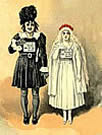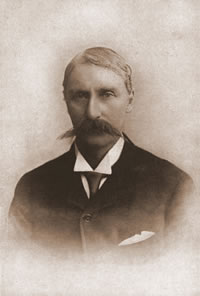 |
 |
 |
||||||
INTRODUCTION
by Clifton Coles
The Mountebanks was W. S. Gilbert's first libretto after the infamous"Carpet Quarrel" of 1890 which broke up (temporarily) his partnership with Arthur Sullivan. The story, that of people drinking a potion to make them actually become the characters they are pretending to be, was apparently very important to Gilbert, who tried several times to get Sullivan to set it. Once the partnership was broken (for what looked like permanently), Gilbert began searching for another composer. His first choice was Arthur Goring Thomas, who began work but who soon began to suffer a mental decline. Gilbert then turned to Alfred Cellier (1844-1891), a long-time associate and friend of Gilbert and Sullivan who had served as musical director for the D'Oyly Carte Opera Company until 1884. Cellier's operetta Dorothy had been a runaway hit in 1886, playing for more than 900 performances. This surpassed the longest run of any of the Gilbert and Sullivan canon, a fact that distressed Sullivan very much. Cellier agreed to compose Gilbert's libretto, but he too became very ill during its composition. He died of tuberculosis on December 28, 1891, a few days before The Mountebanks premiered on January 4, 1892.

Cellier wrote his first operetta in 1870 and became associated with the D'Oyly Carte Opera Company in 1877, serving as conductor of many of the Gilbert and Sullivan premieres in New York and Australia. He composed many songs and piano pieces, a dozen or so operettas (mostly short curtain-raisers), and one grand opera, The Masque of Pandora (1881), based on Longfellow. His other full-length operas, Dorothy (1886), Doris (1889), and The Mountebanks, stand as solid representations of a great talent. He was not Sullivan, however, and listeners to his scores should be prepared for a composer with his own musical style.
The music for The Mountebanks was deservedly highly praised. It is certainly an inventive score, a fact not immediately apparent from perusing the libretto alone. The setting of Alfredo's "Bedecked in fashion trim" has an unexpected breeziness and the men's chorus on greeting Alfredo as a Duke in act two is fascinating in its melody and four-part harmony. A soulful clarinet characterizes madness Teresa in act two, as does the cello in "Willow, willow, where's my love." The clockwork duet "If our action's stiff and crude," the most popular number in the opera, is certainly the funniest. Some of the greatest musical interest comes during the many choruses for female voices. Perhaps less obvious is the musical relationship between the opening chaunt "Miserere," which, with slight alteration, becomes "Time there was when earthly joy" when the outlaws become real monks. Probably most thrilling of all is the tune-combination of this mock-chaunt with the girls' waltz-chorus"An hour, 'twill rapidly pass."
Cellier's death left the opera with no overture and no entr'acte. The Lyric Theatre's music director Ivan Caryll took the first movement of Cellier's Suite Symphonique (a somewhat difficult piece) as the overture and arranged Teresa's "All alone to my eerie" as a charming entr'acte. Caryll also was left to do the score's final arrangements and probably wrote a number or two, though just what is his and what is Cellier's is not quite clear.
Why was this libretto so important to Gilbert? The psychological ramifications of people becoming who they pretend to be are not explored in The Mountebanks. Only Teresa is really effected, but she seems to be recovering by the final curtain. A deeper examination of his characters may have given us insight into the importance of the story to Gilbert. Unfortunately, the story as it is worked out is very mechanical and the characters motivated only for mercenary reasons. There isn't even room for surprise since we see all the characters pretending in the first act to be what they become for real in the second. Delineating the difference between the pretense and the reality must have presented quite a challenge for the original performers. Despite The Mountebanks' apparent importance to him, Gilbert seems to have let the material run away with him, and he later disowned it altogether.

The play is entirely unbalanced in favour of Teresa, who has more singing material than any other character Gilbert created, including the Lord Chancellor in Iolanthe. Besides participating in three duets and other concerted material, she has four solos (three of which are lengthy) — five if one counts edited material at the commencement of the act two finale. Furthermore, the libretto is not clear whether or not she is actually in love with Alfredo at the beginning, though she is coupled with him "heart and heart, hand in hand" at the end. Plainly she is vain, like so many other Gilbert heroines, but she seems more interested in baiting Alfredo and her feigning madness as a result of his momentary preference for Ultrice comes across as a bit unmotivated. Perhaps it was left to the actress (Ivan Caryll's wife Geraldine Ulmar) to flesh out the nuances of the character in performance.
The Mountebanks is one of Gilbert's messier texts. Some of the blame for this can perhaps be attributed to the incompleteness of the score, but many of Gilbert's edits don't seem that effective. For instance, he leaves in most of the material for Teresa. Furthermore, as she drifts toward madness and suicide in the second act, and tension and drama are nicely built up, Gilbert interrupts the drama by the re-introduction before the act two finale of the clockwork plot and the trio "Ophelia was a dainty little maid." However humorous the material and entertaining the trio (and it is a good song), they constitute a dramatic mistake. It would have been more effective if the momentum of the chorus "Accursed sorcerer!" had led directly to Teresa's entrance and her threatened suicide.
Major differences between the libretto as published and the vocal score(s) are as follows.
1. Recitative for Ultrice and Teresa beginning "Oh, luck unequalled, that I happened here to be" is replaced in the libretto by a monologue for Teresa.
2. Solo material for most of the principals during final ensemble, as well as different words for the final chorus, are absent from the libretto.
3. Song for Pietro "When your clothes from your hat to your socks" appears in the first edition vocal score but was apparently cut before performance. It does not appear in any post-premiere libretto. This song was altered to become "When you find you're a broken-down critter" in The Grand Duke.
4. Two short solos for soprano and contralto (beginning "This jocular monkish pretense/Is all very well in its way") and choral response appear in the vocal score during the ensemble "Time there was when earthly joy" following the chorus "After a weary search."
5. Also during the ensemble "Time there was when earthly joy" the vocal score includes a chorus following Pietro's short solo "Now I'll explain" which begins "This man it's plain/As well as we/Is under a ban."
6. In the vocal score, Alfredo is given a brief solo ("The welcome you so feelingly express") after his entrance with the unconscious Minestra.
7. Song for Ultrice "When hungry cat" appears in the vocal score but not in any post-premiere libretto.
8. In the vocal score, at the conclusion of "Oh, please you not to go away," there is short solo for Pietro "Have pity!" followed by a repeat (from the first act finale) of "Commencing with a gentle pain," followed by repeat of chorus "Accursed sorcerer!" The libretto ends this number with "Accursed sorcerer!" (sung only once).
9. Trio for Nita, Bartolo, and Pietro "Ophelia was a dainty little maid" was apparently written as a sort of replacement after Pietro's song was cut. This song appears in the second edition of the vocal score but not the first. It also appears in the libretto as Gilbert left it.
10. Material for Ultrice and Teresa at the beginning of finale to act two. This is the messiest part of the score, several versions of it existing. The libretto on the Archive includes material as published in the vocal score and as edited for the libretto.
The libretto on the Archive has two appendices:
1. Three lyrics which appear in the pre-production libretto, cut before performance.
2. Two lyrics published as "Lost Bab Ballads" which were intended for The Mountebanks but which were not set to music due to Cellier's death. (A third lyric, "The Ballad of the Jim-Jams," is included in the libretto at its proper place, this being Pietro's "When your clothes from your hat to your socks," for which music was actually composed.)